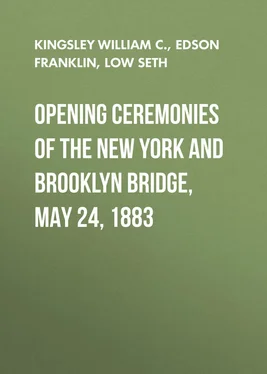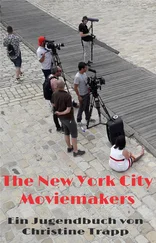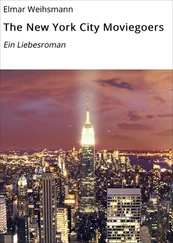William Kingsley - Opening Ceremonies of the New York and Brooklyn Bridge, May 24, 1883
Здесь есть возможность читать онлайн «William Kingsley - Opening Ceremonies of the New York and Brooklyn Bridge, May 24, 1883» — ознакомительный отрывок электронной книги совершенно бесплатно, а после прочтения отрывка купить полную версию. В некоторых случаях можно слушать аудио, скачать через торрент в формате fb2 и присутствует краткое содержание. Жанр: История, История, foreign_antique, foreign_prose, на английском языке. Описание произведения, (предисловие) а так же отзывы посетителей доступны на портале библиотеки ЛибКат.
- Название:Opening Ceremonies of the New York and Brooklyn Bridge, May 24, 1883
- Автор:
- Жанр:
- Год:неизвестен
- ISBN:нет данных
- Рейтинг книги:3 / 5. Голосов: 1
-
Избранное:Добавить в избранное
- Отзывы:
-
Ваша оценка:
- 60
- 1
- 2
- 3
- 4
- 5
Opening Ceremonies of the New York and Brooklyn Bridge, May 24, 1883: краткое содержание, описание и аннотация
Предлагаем к чтению аннотацию, описание, краткое содержание или предисловие (зависит от того, что написал сам автор книги «Opening Ceremonies of the New York and Brooklyn Bridge, May 24, 1883»). Если вы не нашли необходимую информацию о книге — напишите в комментариях, мы постараемся отыскать её.
Opening Ceremonies of the New York and Brooklyn Bridge, May 24, 1883 — читать онлайн ознакомительный отрывок
Ниже представлен текст книги, разбитый по страницам. Система сохранения места последней прочитанной страницы, позволяет с удобством читать онлайн бесплатно книгу «Opening Ceremonies of the New York and Brooklyn Bridge, May 24, 1883», без необходимости каждый раз заново искать на чём Вы остановились. Поставьте закладку, и сможете в любой момент перейти на страницу, на которой закончили чтение.
Интервал:
Закладка:
Franklin Edson
Opening Ceremonies of the New York and Brooklyn Bridge, May 24, 1883
INTRODUCTORY
The New York and Brooklyn Bridge was formally opened on Thursday, May 24th, 1883, with befitting pomp and ceremonial, in the presence of the largest multitude that ever gathered in the two cities. From the announcement by the Trustees of the date which was to mark the turning-over of the work to the public, it was evident that the popular demonstration would be upon a scale commensurate with the magnificence of the structure and its importance to the people of the United States. The evidences of widespread and profound interest in the event were early and unmistakable. They were not confined to the metropolis and its sister city on the Long Island shore, nor yet to the majestic Empire State. The occurrence was recognized as one of National importance; and throughout the Union, from the rocky headlands of Maine to the golden shores of the Pacific, and from the gleaming waters of the St. Lawrence to the vast expanse of the Mexican Gulf, the opening ceremonies were regarded with intelligent concern and approval. Nearly every State contributed its representatives to the swelling throng that attended, while those who were unable to be present contemplated with pride and satisfaction the completion and consecration to its purpose of the greatest engineering work of modern times.
In the communities most directly benefited by the Bridge the demonstration was confined to no class or body of the populace. It was a holiday for high and low, rich and poor; it was, in fact, the People's Day. More delightful weather never dawned upon a festal morning. The heavens were radiant with the celestial blue of approaching summer; silvery fragments of cloud sailed gracefully across the firmament like winged messengers, bearing greetings of work well done; the clearest of spring sunshine tinged everything with a touch of gold, and a brisk, bracing breeze blown up from the Atlantic cooled the atmosphere to a healthful and invigorating temperature. The incoming dawn revealed the twin cities gorgeous in gala attire. From towering steeple and lofty façade, from the fronts of business houses and the cornices and walls of private dwellings, from the forests of shipping along the wharves and the vessels in the dimpled bay, floated bunting fashioned in every conceivable design, while high above all, from the massive and enduring granite towers of the Bridge the Stars and Stripes signaled to the world from the gateway of the continent the arrival of the auspicious day.
Almost before the sun was up the thoroughfares of both cities put on a festival appearance. Business was generally suspended. The mercantile and professional communities vied with one another in the extent and splendor of their decorations, while from the hearty voice of Labor arose a chorus of ringing acclamation. Tens of thousands of men, women and children crowded into the streets, and, after gazing admiringly upon the decorations, wended their way in the direction of the mighty river span. From neighboring cities and from the adjacent country for many miles around the incoming trains brought multitudes of excursionists and sight-seers. It seemed marvelous that they could all find accommodation, but the generous hospitality of the cities was cordially extended, and all were adequately provided for. The scenes presented during the day upon the streets and avenues of New York and Brooklyn will never be forgotten by those who witnessed them. Notwithstanding the enormous massing of people, the best of order was everywhere observable, and the day happily was free from any accident of a serious nature. The arrangements for the celebration were of a sensible and becoming character, and beside insuring an unobstructed and speedy course for the ceremonies, contributed beyond measure to the popular enjoyment.
Early in the afternoon the President of the United States, Gen. Chester A. Arthur, and the Hon. Grover Cleveland, Governor of the State of New York, the former accompanied by the members of his Cabinet and the latter by the officers of his Staff, were escorted from the Fifth Avenue Hotel to the New York City Hall, where they were joined by his Honor Mayor Franklin Edson and the New York officials. From the City Hall the procession proceeded to the New York Approach to the Bridge. The Seventh Regiment, N.G., S.N.Y., Col. Emmons Clark, commanding, acted as escort to the Presidential and Gubernatorial party. The regimental band, of 75 pieces, headed the column and played popular airs as the procession moved along the crowded and gaily decorated thoroughfares. At the New York Tower a battalion of the Fifth United States Artillery, under command of Major Jackson, joined the escort, and between the lines of brilliantly uniformed troops the distinguished guests passed upon the roadway. They were formally received by a Committee of the Bridge Trustees, headed by Mr. William C. Kingsley, Vice-President and acting President of the Board.
The arrival at the New York Tower was proclaimed to the multitudes on shore by the thundering of many cannon. Salutes were fired from the forts in the harbor, from the United States Navy Yard, and from the summit of Fort Greene. The United States fleet, consisting of the "Tennessee," the "Yantic," the "Kearsarge," the "Vandalia," and the "Minnesota," Rear-Admiral George H. Cooper, commanding, was anchored in the river below the Bridge and joined in the salute. As the procession moved across the roadway the yards of the men-of-war were manned, and from the docks and factories arose a tremendous babel of sounds, caused by the clanging of bells, the roaring of steam whistles, and the cheers of enthusiastic people, while sounding from afar, in delightful contrast with the clamorous discord, the silver chimes of Trinity rang out upon the river.
In the ornate iron railway depot at the Brooklyn terminus, where the exercises were to take place, the arrival of the approaching procession was anxiously awaited. The interior was bright with tasteful decorations, the prevailing feature being the sky-blue hangings of satin bordered with silver, and the coats-of-arms of the States appropriately interspersed amid a forest of flags. On the Brooklyn side the duties of escort were transferred to the 23d Regiment, N.G., S.N.Y., Colonel Rodney C. Ward commanding. The regiment appeared upon this occasion for the first time in their new State service uniform, and performed their duties most efficiently. The arrangements for the procession and exercises were under the direction of Major-General James Jourdan, commanding the Second Division, N.G., S.N.Y., who was ably assisted by the members of the Division Staff. The building was thronged in every part. In the throng were many of the most conspicuous citizens of New York and other States, including representatives of the bench, the bar, the pulpit, the press, and all other professions. Beside the President and his Cabinet, consisting of the Hon. Charles J. Folger, Secretary of the Treasury; the Hon. William E. Chandler, Secretary of the Navy; the Hon. Henry M. Teller, Secretary of the Interior; the Hon. Walter Q. Gresham, Postmaster-General, and the Hon. Benjamin Harris Brewster, Attorney-General; and Governor Cleveland and Staff, there were present the Governors of several States and the Mayors of nearly all the cities in the vicinity of the metropolis. In the vast assemblage none were more conspicuous than the officers of the Army and Navy, who occupied an entire section and attracted general attention.
When the Presidential party and their escort entered the hall they were greeted with enthusiastic cheers. They occupied seats directly opposite the stand erected for the orators of the day. The exercises proceeded without delay in an orderly manner, and were appropriate and impressive throughout.
Читать дальшеИнтервал:
Закладка:
Похожие книги на «Opening Ceremonies of the New York and Brooklyn Bridge, May 24, 1883»
Представляем Вашему вниманию похожие книги на «Opening Ceremonies of the New York and Brooklyn Bridge, May 24, 1883» списком для выбора. Мы отобрали схожую по названию и смыслу литературу в надежде предоставить читателям больше вариантов отыскать новые, интересные, ещё непрочитанные произведения.
Обсуждение, отзывы о книге «Opening Ceremonies of the New York and Brooklyn Bridge, May 24, 1883» и просто собственные мнения читателей. Оставьте ваши комментарии, напишите, что Вы думаете о произведении, его смысле или главных героях. Укажите что конкретно понравилось, а что нет, и почему Вы так считаете.











